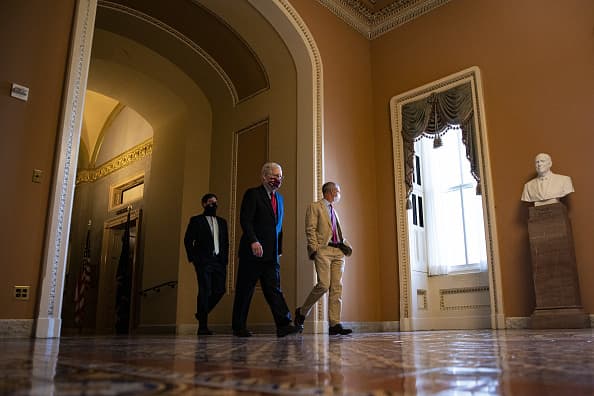Democrats and Republicans still haven’t reached a deal on another stimulus package.
Al Drago/Bloomberg via Getty Images
It’s a scary time for millions of Americans as Congress is still unable to reach a compromise on a stimulus package that could include another round of direct payments and more unemployment benefits.
Jobless rates are still high, and cases of the coronavirus show no sign of abating.
Yet even without a formal deal between Republicans and Democrats, a number of relief measures are still available to many.
Those include the Centers for Disease Control and Prevention’s announcement that most renters struggling to pay their rent amid the pandemic can’t be evicted through the end of the year.
And although the $600 federal unemployment checks came to an end in July, the executive action President Donald Trump took in August will result in many jobless Americans seeing an extra $300-a-week boost for at least a limited time.
And this week the president urged Republicans to agree to a larger stimulus package – so more relief still may come.
But for now, here’s what help you can actually rely on.
Unemployment benefits
Trump said he would send jobless Americans a $400 weekly payment. Yet, because the policy would require states to come up with $100 of that expanded benefit, most people will actually end up with $300 a week, though Montana, Kentucky and West Virginia have found a way to give out the whole amount.
What’s more, states might not have more than six weeks’ worth of these payments. In some cases, it may be even less. South Dakota has said it won’t even apply for the funds at all.
More from Personal Finance:
At least 20 states start paying extra $300 weekly unemployment benefit
The CDC banned evictions, but some renters are still vulnerable
Still haven’t filed your 2019 tax return? Penalties are about to get steeper
And to qualify for the subsidy, you have to receive at least $100 a week in unemployment benefits from your state. That could leave out more than 900,000 people.
Beyond the federal boost, most jobless Americans will continue to get state unemployment benefits.
Thanks to the CARES Act, most workers will be able to collect these payments for 39 weeks, or even more in some cases.
Stimulus checks
Until recently, another round of cash payments to Americans had bipartisan support and seemed all but certain.
Yet in Republicans’ most recent relief proposal, there was no mention of stimulus checks.
Trump’s executive action taken in August also didn’t include the payments; it’s up to Congress to authorize another round.
There’s still hope: White House chief of staff Mark Meadows told CNBC on Wednesday that a compromise could come sooner than later, and the president still seems to support the payments.
“If there’s going to be a deal that actually helps us make a soft landing, I think that deal has to happen in the next week to 10 days,” Meadows said.
Evictions are banned for now
As millions of Americans grapple with a loss in income and difficultly paying their bills, most should at least be protected from eviction until the end of the year.
That’s because earlier this month, the CDC made it illegal for landlords across the U.S. to evict tenants who can’t afford to pay their rent.
One important caveat: Renters will need to sign a declaration form and give it to their landlords to make sure they’re protected. And to qualify, individuals have to expect to earn less than $99,000 a year in 2020 and couples, under $198,000.
Worrying advocates is the fact that some states seem to be adopting a more narrow application of the CDC ban.
For example, the CDC doesn’t say anything about renters needing to provide documentation to prove that they qualify for the protection aside from the declaration form, but in Maryland, evidence may be required.
And in Michigan, it’s up to a judge’s interpretation of what stages of an eviction the CDC’s ban should apply to.
Experts say renters worried about eviction should seek legal help in their area. You can do so at Lawhelp.org.
Tax cuts
A break from student loans
Trump’s executive order also granted people with federal student loans a break from their bills until January, during which interest will not accrue. There have been some questions over whether such a move is constitutional, but the U.S. Department of Education has now announced that it will fully implement the president’s memorandum.
The payment pause through Dec. 31, 2020, is automatic. If your loans qualify for the reprieve, you shouldn’t have to request it with your servicer, unlike the Education Department’s usual forbearances and deferments.
Meanwhile, Senate Minority Leader Chuck Schumer, D-N.Y., and Sen. Elizabeth Warren, D-Mass., called on President Donald Trump to take executive action to forgive up to $50,000 in debt for borrowers.
With relief measures in limbo, how are you and your family faring financially? If you’re willing to share your story, please email me at annie.nova@nbucni.com
